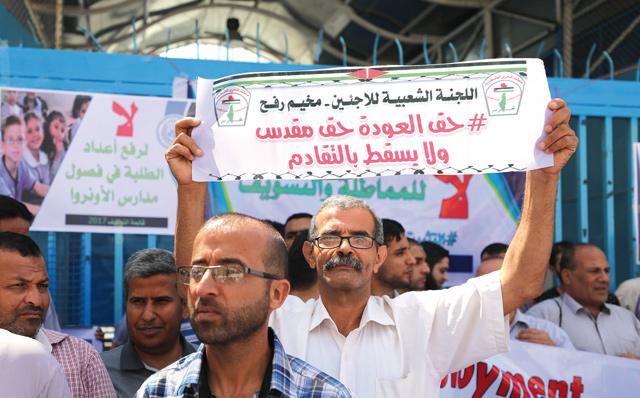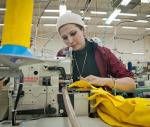You are here
UNRWA Jordan personnel strike over degradation of work conditions
By Ana V. Ibáñez Prieto - May 17,2018 - Last updated at May 17,2018
AMMAN — Around 7,000 workers at UNRWA general presidency and field office in Jordan on Wednesday suspended their operations for an hour and staged a sit-in in front of the agency’s Amman headquarters, protesting the "sharp reductions in UNRWA's educational, health and social relief services and the erosion of their workers’ rights”.
UNRWA’s workers unions in the Kingdom began the implementation of escalating measures earlier this month after the cuts entailed in the recently issued employee and retiree benefit regulation. They forwarded statements to the agency’s administration and other related parties and started an open-ended hunger strike on May 13.
In a recent statement by the United Nations Relief and Works Agency (UNRWA) staff union, protesters complained that “local employees have lost many of their original rights acquired over previous years as a result of the administration’s instructions”, complaining over the loss of rights and functional benefits, such as unpaid leave and early voluntary retirement, in addition to “the unprecedented increase in health insurance premiums for local employees in light of the rising cost of living”.
In this regard, they demanded for the salaries of all workers to be reconsidered, calling for the administration to bear all increases in insurance premiums for employees and retirees while allowing for the return of daily paid workers so as to relieve the pressure on regular staff.
In a statement sent to The Jordan Times, UNRWA sources clarified that the agency’s department of health signed the new collective health insurance policy after the proposal was submitted to both the local procurement committee and the procurement advisory committee, where it was agreed that the UNRWA operations manager would sign the contract with the recommended service provider in order to provide better quality insurance services for employees and their families.
“The rate of increase of the monthly premium for the basic class equals JD2.5 per person,” the statement said, pointing out that “the rise in the new insurance premiums cannot be avoided as it is an inevitable result of the inflation in medical costs over the past two years, and it has been reduced to this level through painstaking efforts with the new company”.
“While UNRWA understands the economic conditions and the high cost of the employee, it should be noted that the agency bears the burden of additional expenses in light of the most unprecedented financial crisis in the history of the agency,” the sources stressed, assuring that “UNRWA did not consider leaving the staff and their families without proper health insurance, and the linkage between the austerity measures of the agency and the aforementioned health insurance is unfair and baseless”.
Earlier this year, spokesperson of UNRWA Sami Mshasha warned that the agency may stop providing its services in all of its operating areas in September due to its chronic financial crisis, affecting the nearly 2 million refugees currently based in Jordan.
Director of UNRWA operations in Jordan Roger Davies told The Jordan Times: “At stake is the education of 122,000 children enrolled in 171 schools around the country, as well as the education of around 4,000 young men and women enrolled in our two vocational centres and teachers training college.”
UNRWA’s financial crisis began after US President Donald Trump cut $350 million in US aid to the humanitarian organisation in January this year.
Although not officially declared by the US administration, the cuts come after the Palestinian leadership refused to meet US Vice President Mike Pence during his visit to the region and rejected any future role for the US in the peace process following US President Donald Trump’s decision in December last year to recognise Jerusalem as the capital of Israel.
Speaking at the World Economic Forum in Davos in January, Trump said: “When they disrespected us a week ago by not allowing our great vice president to see them, and we give them hundreds of millions of dollars in aid and support, tremendous numbers, numbers that nobody understands — that money is on the table and that money is not going to them unless they sit down and negotiate peace.”
Related Articles
AMMAN — Workers at UNRWA General Presidency and Field Office in Jordan suspended a planned open-ended strike scheduled to begin on Monday.Th
AMMAN — “UNRWA is moving ahead on the assumption that we are here to stay and we will continue to improve our services regardless of the fin
GAZA CITY, Palestinian Territories — Dozens of Palestinians and employees of the UN Relief and Works Agency for Palestine Refugees (UNRWA) d


















